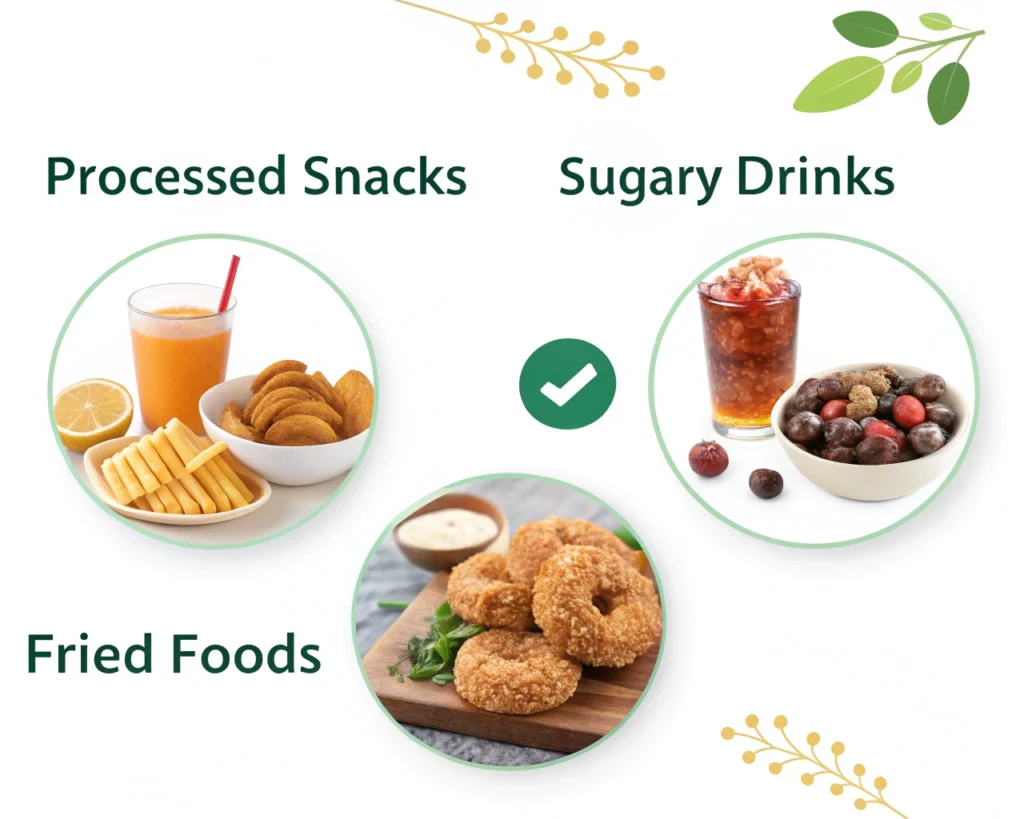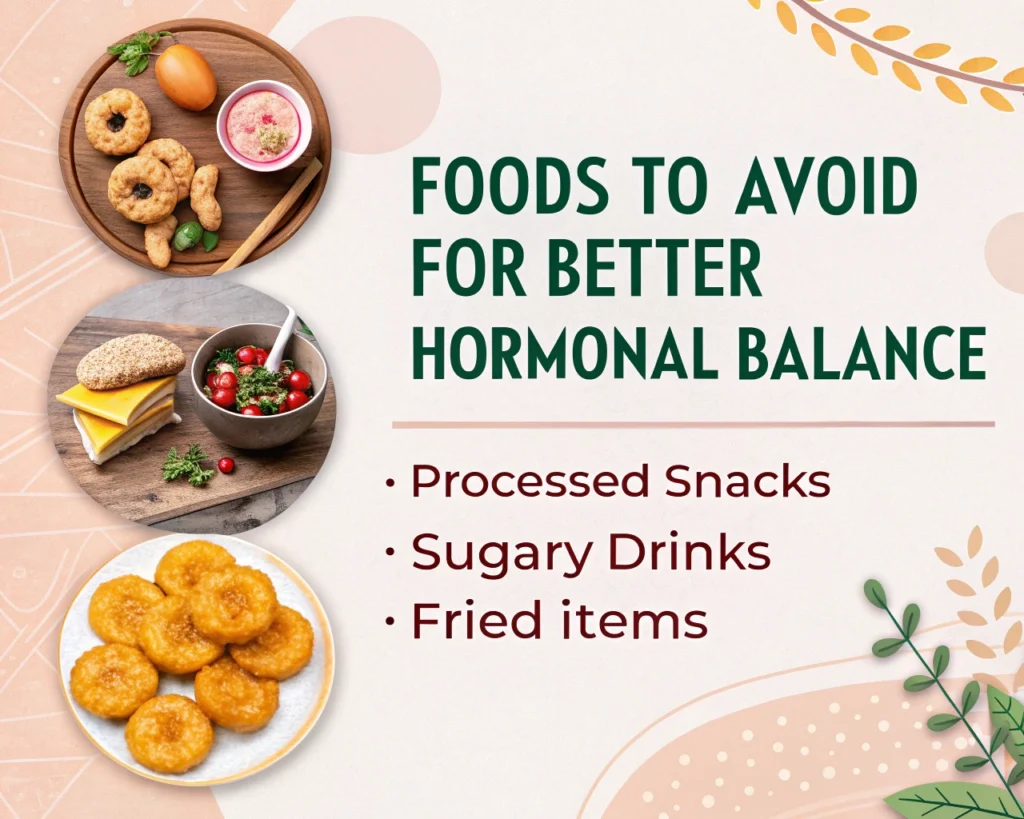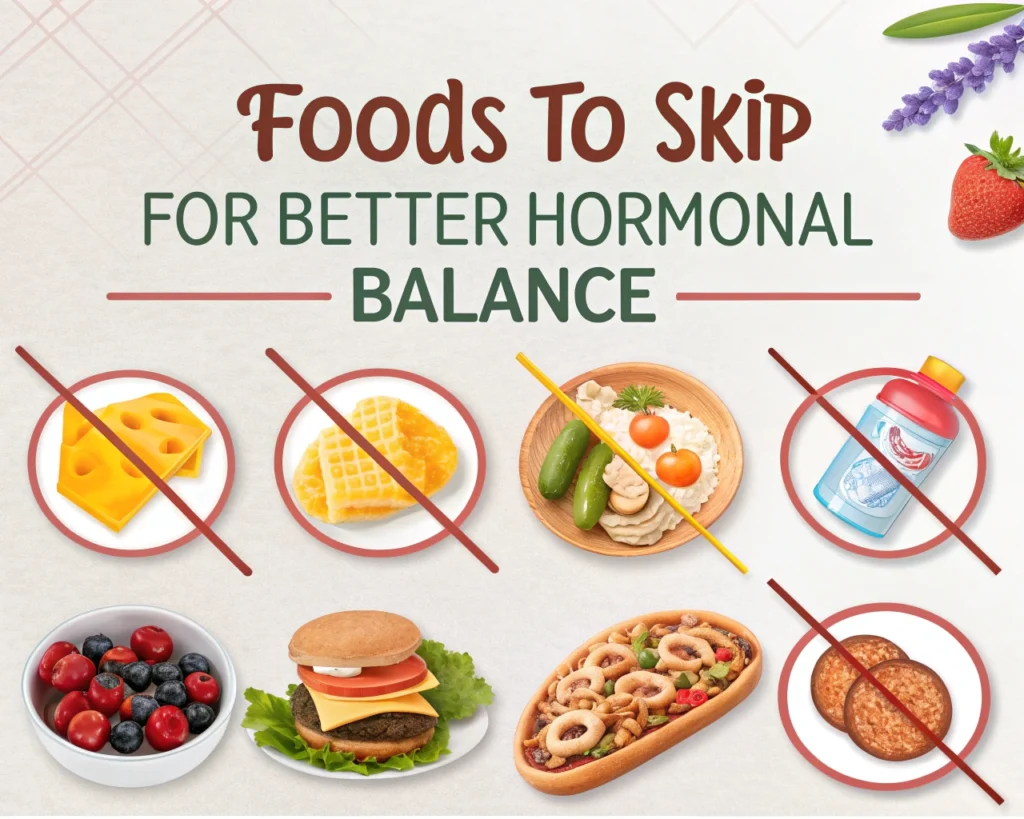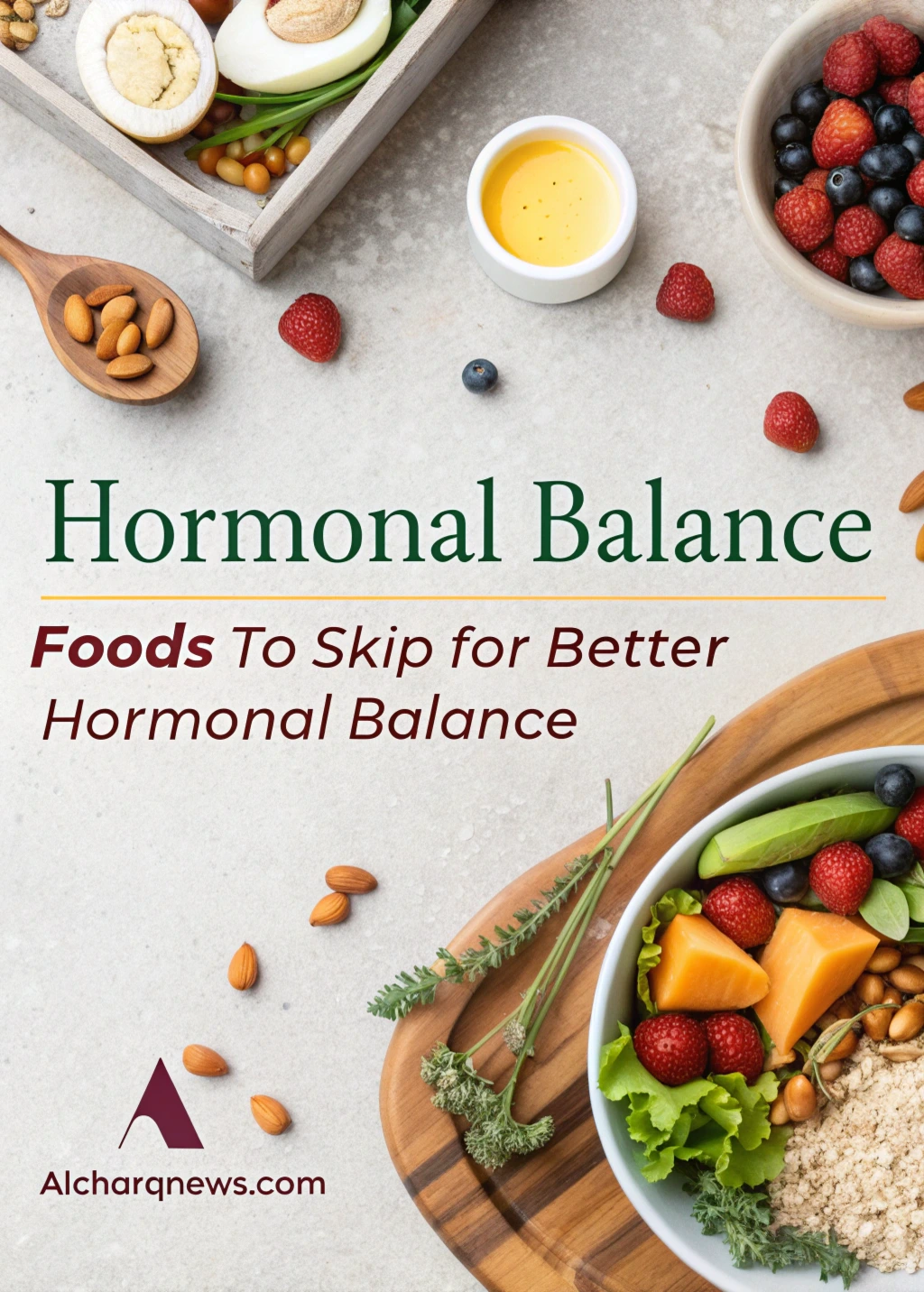Introduction: The Hidden Connection Between Your Plate and Your Hormones
Remember that morning when you woke feeling inexplicably foggy despite a full night’s sleep? Or that afternoon when irritability seemed to take over without reason? Your body might have been sending signals about something amiss with your hormonal balance—and your breakfast or lunch could be the hidden culprit.
The relationship between what lands on your fork and how your endocrine system functions runs deeper than many realize. Throughout my years working with clients struggling with unexplained fatigue, weight fluctuations, and mood disturbances, I’ve witnessed remarkable transformations once certain foods disappeared from their plates. What many dismissed as “just getting older” or “that time of month” often reflected a more fundamental disruption happening at the cellular level.
Your daily food choices aren’t just fuel—they’re active messengers conversing directly with your hormonal system. Let’s explore which common foods might be whispering chaos into this delicate conversation, and discover how simple dietary shifts can help restore your energy, clarity, and natural rhythms.
Table of contents

Understanding Hormonal Balance: Why It Matters for Everyone
What Are Hormones and How Do They Work?
Hormones function as your body’s chemical messengers, orchestrating countless functions from metabolism and growth to mood regulation and reproductive processes. Created by specialized glands comprising your endocrine system—including the thyroid, adrenals, and ovaries or testes—these powerful compounds travel through your bloodstream, delivering precise instructions to tissues and organs throughout your body.
When functioning optimally, this intricate chemical network maintains remarkable balance, keeping your energy steady, sleep restorative, and mood stable. However, this balance proves remarkably fragile. Recent research indicates that approximately 80% of women and a surprising 40% of men experience noticeable hormonal disruptions at some point in their lives, manifesting as symptoms including:
- Persistent fatigue despite adequate sleep
- Unexplained weight changes, especially around the midsection
- Mood fluctuations ranging from anxiety to low mood
- Diminished cognitive clarity or “brain fog”
- Sleep disturbances despite proper sleep hygiene
The Food-Hormone Connection
The foods gracing your plate wield remarkable influence over hormonal function through multiple pathways. A 2023 review published in the Journal of Clinical Endocrinology established that dietary choices directly impact hormone production, metabolism, and receptor sensitivity. This relationship flows both ways—your hormones affect how your body processes nutrients, while those same nutrients determine how effectively your hormones function.
Inflammation represents a critical link in this relationship. Certain foods trigger inflammatory cascades that disrupt endocrine communication, essentially creating static in the hormonal conversation. Additionally, many common food additives and pesticides function as endocrine disruptors, compounds that mimic or interfere with natural hormone activity at the cellular level.
Top 10 Foods to Avoid for Better Hormonal Balance
1. Refined Sugar and High-Fructose Corn Syrup
Few substances disrupt hormonal harmony more thoroughly than refined sugar. When consuming sweetened beverages, pastries, or packaged snacks, your blood glucose rapidly spikes, triggering an insulin surge to manage this influx. This dramatic hormonal response sets off a cascade affecting numerous other hormones.
Research from Stanford University demonstrated that even moderate sugar consumption elevates cortisol (your primary stress hormone) while simultaneously disrupting leptin and ghrelin—key hormones regulating hunger and satiety. For those experiencing reproductive hormone challenges, the news worsens: studies link regular sugar consumption to worsened PMS symptoms, fertility challenges, and exacerbated menopausal discomfort.
Sugar hides cunningly in countless products where you’d least expect it—pasta sauce, salad dressings, and even “healthy” granola bars often harbor surprising amounts. Start reading ingredient lists carefully, watching for terms like sucrose, dextrose, maltose, and the particularly problematic high-fructose corn syrup.
2. Conventional Dairy Products
While calcium-rich dairy offers nutritional benefits, conventional dairy products frequently contain residual synthetic hormones administered to cows for increased milk production. These compounds, including recombinant bovine growth hormone (rBGH), can potentially interact with your endocrine system.
Research published in Environmental Health Perspectives suggests that regular consumption of conventional dairy correlates with elevated estrogen levels in consumers, potentially contributing to estrogen dominance—a common hormonal imbalance pattern. Women experiencing endometriosis, fibroids, or severe PMS symptoms often notice significant improvement when limiting dairy intake.
If eliminating dairy completely feels challenging, consider transitioning to organic, grass-fed options produced without synthetic hormones, or exploring fermented dairy like kefir, which provides beneficial bacteria supporting hormone metabolism.
3. Processed Vegetable and Seed Oils
The vegetable oils crowding supermarket shelves—canola, corn, soybean, and sunflower—undergo extensive processing involving chemical solvents, high heat, and bleaching agents. This processing creates inflammatory compounds that research links to disrupted hormone receptor function.
These industrial oils contain disproportionately high omega-6 fatty acids while lacking omega-3s, creating an imbalance that promotes inflammatory pathways. A landmark study published in Nutrition Research demonstrated that this inflammatory pattern directly impacts thyroid function and insulin sensitivity—two cornerstone aspects of metabolic health.
Consider replacing these processed oils with extra-virgin olive oil, avocado oil, or coconut oil, which provide hormone-supporting fatty acids without the inflammatory burden.

4. Alcohol
That evening glass of wine might seem like harmless relaxation, but alcohol impacts hormonal balance through multiple mechanisms. Your liver—the primary organ responsible for hormone metabolism—becomes preoccupied with processing alcohol, creating a backlog of hormones awaiting clearance.
For women, even moderate alcohol consumption can elevate estrogen levels while disrupting progesterone production. Men experience decreased testosterone production with regular drinking. Additionally, alcohol significantly elevates cortisol while disrupting sleep architecture, creating a perfect storm for hormonal disruption.
If completely eliminating alcohol feels unrealistic, consider limiting consumption to special occasions, or explore alcohol-free alternatives that provide similar ritual satisfaction without the hormonal burden.
5. Caffeine and Energy Drinks
Your morning coffee ritual might warrant reconsideration if hormonal balance concerns you. Caffeine stimulates adrenaline and cortisol production, temporarily increasing alertness but potentially straining your adrenal glands over time. This proves especially problematic when consumed later in the day, as elevated cortisol disrupts natural cortisol rhythms essential for proper sleep and recovery.
Energy drinks compound these effects, combining caffeine with sugar for a double hormonal hit. Research from the University of California found that regular energy drink consumers showed altered cortisol patterns resembling those seen in chronic stress conditions.
Weaning gradually works better than cold-turkey approaches for most people. Try reducing intake by one quarter each week, potentially transitioning to ceremonial-grade matcha, which provides gentler stimulation alongside beneficial L-theanine.
Hormone-Disrupting Ingredients to Watch For
Common Food Additives That Impact Hormonal Health
Beyond whole foods themselves, numerous additives lurking in processed products can directly disrupt endocrine function:
| Ingredient | Where It’s Found | Hormonal Impact |
|---|---|---|
| BHA/BHT | Processed foods, cereals | Mimics estrogen activity |
| MSG | Packaged snacks, soups | Can impact thyroid function |
| Artificial food dyes | Candy, baked goods | Linked to endocrine disruption |
| Sodium nitrite | Processed meats | Thyroid disruption potential |
| Propyl gallate | Meat products, microwave popcorn | Estrogen mimicker |
Hidden Sources of Hormone Disruptors in Food Packaging
The container holding your food matters nearly as much as its contents. Bisphenol-A (BPA) and similar compounds in can linings and plastic containers leach into food, particularly when heated, acting as potent endocrine disruptors. Studies consistently demonstrate BPA’s ability to mimic estrogen in the body, potentially contributing to reproductive health challenges and metabolic disruption.
Consider transferring packaged foods to glass containers upon arriving home, never microwave plastic regardless of “microwave-safe” claims, and choose fresh or frozen produce over canned versions whenever possible.
Better Choices: Foods That Support Hormonal Balance
Nutrient-Dense Foods for Hormone Health
While eliminating problematic foods constitutes an essential first step, actively incorporating hormone-supporting options completes the picture:
| Food Category | Examples | Hormonal Benefits |
|---|---|---|
| Healthy fats | Avocados, olive oil, coconut oil | Provides building blocks for hormone production |
| Cruciferous vegetables | Broccoli, cauliflower, Brussels sprouts | Helps metabolize excess estrogen |
| Quality proteins | Wild-caught fish, pasture-raised eggs | Stabilizes blood sugar and supports adrenal health |
| Adaptogenic herbs | Ashwagandha, holy basil, rhodiola | Helps regulate stress hormones |
| Fermented foods | Kimchi, sauerkraut, kefir | Supports gut microbiome and hormone metabolism |
Simple Swaps for Better Hormonal Health
Small, consistent changes typically yield better results than dramatic overnight overhauls. Consider these practical substitutions:
- Replace morning coffee with dandelion tea or mushroom elixirs
- Swap vegetable oils for avocado oil or olive oil
- Choose dark chocolate with at least 70% cacao content instead of sugary treats
- Trade conventional dairy milk for organic coconut or almond milk
- Replace refined grains with quinoa, buckwheat, or millet
Creating a Hormone-Supportive Eating Plan
Beyond individual foods, the timing and structure of your meals significantly impact hormonal function. Your body thrives on consistency—eating at relatively regular intervals helps maintain stable blood sugar, perhaps the single most important factor for hormonal equilibrium.
Consider front-loading protein at breakfast, as research shows this approach helps regulate ghrelin and leptin throughout the day. Additionally, allowing 3-4 hours between meals (rather than constant snacking) gives your digestive system valuable recovery time, supporting optimal hormone production and metabolism.
Conclusion: Your Hormonal Health Journey
The path toward hormonal harmony begins with awareness and unfolds through consistent small choices. Remember that your body possesses remarkable restorative capacity—given the right environment, your endocrine system can recalibrate and function optimally once again.
Start by eliminating just one hormone-disrupting food from your routine this week. Notice how your energy, mood, and sleep respond. Then gradually incorporate more supportive choices, allowing your body time to adapt and respond.
Your hormonal health journey represents one of the most worthwhile investments you’ll make—one that pays dividends in energy, clarity, emotional stability, and overall vitality. What single change will you implement today to support your endocrine system?

FAQs About Foods and Hormonal Balance
Q: How quickly can dietary changes improve hormonal balance?
A: While individual results vary considerably, many people notice improvements in energy and mood within 2-3 weeks of eliminating key disruptors from their diet. More established hormonal imbalances typically require 3-6 months of consistent dietary support before showing substantial improvement.
Q: Can hormonal balance through diet help with fertility issues?
A: Research strongly suggests that dietary choices significantly impact reproductive hormonal balance. A 2022 Harvard study found that women following anti-inflammatory eating patterns showed 31% higher conception rates than those consuming typical Western diets high in processed foods and sugar.
Q: Is coffee completely off-limits for hormonal balance?
A: Individual sensitivity to caffeine varies tremendously. Some people metabolize caffeine quickly with minimal hormonal disruption, while others experience significant cortisol spikes from even small amounts. Consider a two-week elimination to assess your personal hormonal balance response.
Q: Do men need to worry about hormonal balance in their diet as well?
A: Absolutely. While hormonal balance discussions often center on women’s health, men’s endocrine systems prove equally susceptible to dietary disruption. Hormonal imbalances in men commonly manifest as decreased energy, reduced muscle mass, increased abdominal fat, and mood disturbances.
Q: Which single dietary change would have the biggest impact on hormonal balance?
A: For most people, eliminating added sugars and refined carbohydrates yields the most significant and immediate improvements in hormonal function, as this change helps stabilize insulin—the master hormone that influences numerous other endocrine pathways.

